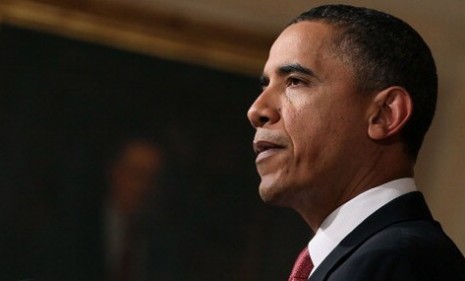Egyptian uprising: Is Obama trying to force Mubarak out?
After a special visit from an Obama envoy Tuesday, the embattled Egyptian leader said he'll step down in September. Is the U.S. elbowing its longtime ally out of power?

A free daily email with the biggest news stories of the day – and the best features from TheWeek.com
You are now subscribed
Your newsletter sign-up was successful
The Obama administration sent former Egypt ambassador Frank Wisner to Cairo with a message for embattled President Hosni Mubarak: It is time to start your exit. Later Tuesday, Mubarak said on national TV that he would step down at the end of his term in September, and hours after that, following a 30-minute phone conversation with Mubarak, Obama said Egypt's "orderly transition must be meaningful, it must be peaceful, and it must begin now." Obama was careful to say that "it is not the role of any other country to determine Egypt's leaders," but is he trying to push its current leader out the door? (See Obama's comments)
Obama's handprints are all over this: So much for all the talk about not meddling in Egypt's affairs, says Keith Koffler in White House Dossier. By sending Wisner to "tell Mubarak he was finished," then calling himself to up the pressure," Obama interfered in the most dramatic way possible." Sure, "Obama made the right move," but his involvement contradicts what the White House said as recently as Monday.
The Week
Escape your echo chamber. Get the facts behind the news, plus analysis from multiple perspectives.

Sign up for The Week's Free Newsletters
From our morning news briefing to a weekly Good News Newsletter, get the best of The Week delivered directly to your inbox.
From our morning news briefing to a weekly Good News Newsletter, get the best of The Week delivered directly to your inbox.
Obama didn't push hard enough: If Mubarak thinks he can stay on until September, he's "clueless," says Nicholas Kristof in The New York Times. And if Obama blew his "political capital" on that "vague promise" of a future exit, "there's a measure of cluelessness on both sides." The protesters already think we're "in bed with Mubarak," and the "choreography" of sending Wisner in just "comes across as collusion." If Mubarak doesn't quit, now, the U.S. will get the blame.
Obama's shoving, but Mubarak isn't moving: Obama made it "crystal clear he's on the side of the street, not the weakened strongman," says Mark Mardell in BBC News. Not only that, he "sounded as if he wanted to join the Egyptians on the streets" himself. The president has dropped the "law professor" demeanor and practically become "the guarantor of a successful revolution." But there's only so much Obama can do, and the "defiant" Mubarak seems to be studiously ignoring the "tough" nudges.
"Obama gets tough on Egypt's weakened strong man"
A free daily email with the biggest news stories of the day – and the best features from TheWeek.com
-
 ‘Those rights don’t exist to protect criminals’
‘Those rights don’t exist to protect criminals’Instant Opinion Opinion, comment and editorials of the day
-
 Key Bangladesh election returns old guard to power
Key Bangladesh election returns old guard to powerSpeed Read The Bangladesh Nationalist Party claimed a decisive victory
-
 Judge blocks Hegseth from punishing Kelly over video
Judge blocks Hegseth from punishing Kelly over videoSpeed Read Defense Secretary Pete Hegseth pushed for the senator to be demoted over a video in which he reminds military officials they should refuse illegal orders
-
 The billionaires’ wealth tax: a catastrophe for California?
The billionaires’ wealth tax: a catastrophe for California?Talking Point Peter Thiel and Larry Page preparing to change state residency
-
 Bari Weiss’ ‘60 Minutes’ scandal is about more than one report
Bari Weiss’ ‘60 Minutes’ scandal is about more than one reportIN THE SPOTLIGHT By blocking an approved segment on a controversial prison holding US deportees in El Salvador, the editor-in-chief of CBS News has become the main story
-
 Has Zohran Mamdani shown the Democrats how to win again?
Has Zohran Mamdani shown the Democrats how to win again?Today’s Big Question New York City mayoral election touted as victory for left-wing populists but moderate centrist wins elsewhere present more complex path for Democratic Party
-
 Millions turn out for anti-Trump ‘No Kings’ rallies
Millions turn out for anti-Trump ‘No Kings’ ralliesSpeed Read An estimated 7 million people participated, 2 million more than at the first ‘No Kings’ protest in June
-
 Ghislaine Maxwell: angling for a Trump pardon
Ghislaine Maxwell: angling for a Trump pardonTalking Point Convicted sex trafficker's testimony could shed new light on president's links to Jeffrey Epstein
-
 The last words and final moments of 40 presidents
The last words and final moments of 40 presidentsThe Explainer Some are eloquent quotes worthy of the holders of the highest office in the nation, and others... aren't
-
 The JFK files: the truth at last?
The JFK files: the truth at last?In The Spotlight More than 64,000 previously classified documents relating the 1963 assassination of John F. Kennedy have been released by the Trump administration
-
 'Seriously, not literally': how should the world take Donald Trump?
'Seriously, not literally': how should the world take Donald Trump?Today's big question White House rhetoric and reality look likely to become increasingly blurred